
Listening to our residents
Residents were concerned about the way we responded to complaints. So we helped them set up Residents’ Association to tackle the issues together.

Tackling food poverty in London
Together with the London Food Insecurity Network and other housing associations, we’re working to create a London where no one goes to bed hungry.

Providing valuable support
The high cost-of-living is challenging for many people. We work with a wide range of partners who can support residents to receive the help they need.

Benefits of apprenticeships
For our colleague Dave Prouten, apprenticeships have benefits both for the individual apprentices and the organisations that take them on.
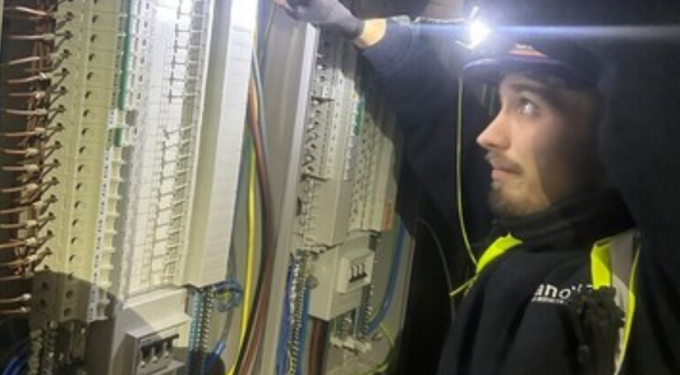
It’s never too late to learn
Billy was struggling to know what he wanted to do with his life. Starting an apprenticeship gave him the opportunity to earn a wage while gaining valuable skills.

Food bank provides support
With so many people struggling with the cost-of-living, food pantries and community kitchens are becoming a lifeline for many Londoners.
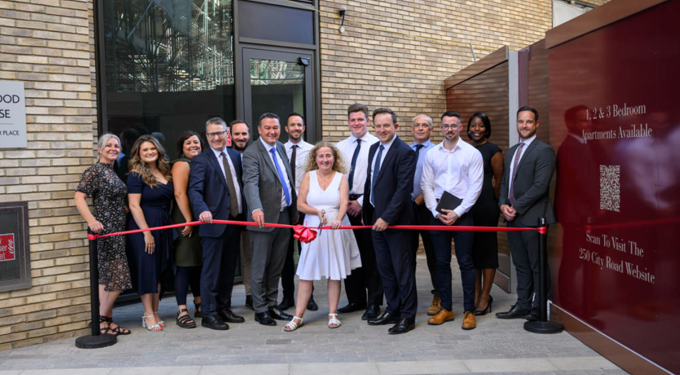
Fostering a culture of learning
From the garden centre to the building site, Roselie’s apprenticeship gave her the perfect opportunity to kick-start her career and learn new skills.
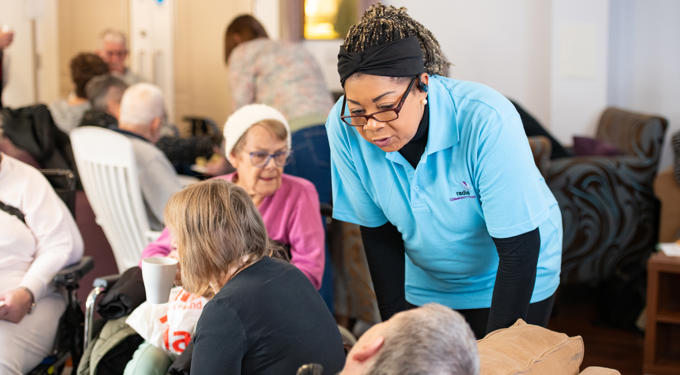
Hospital Discharge Service
There are many challenges associated with leaving hospital and returning home. Our Hospital Discharge Service is here to help our residents.
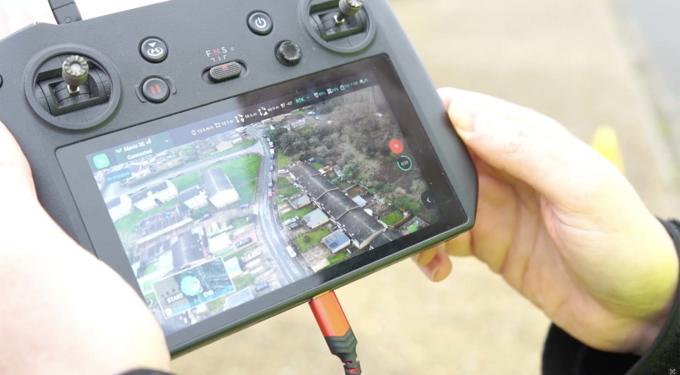
Greener homes programme
Improving the energy efficiency of residents’ homes will help us achieve our goals of lowering energy bills and reducing our carbon footprint.
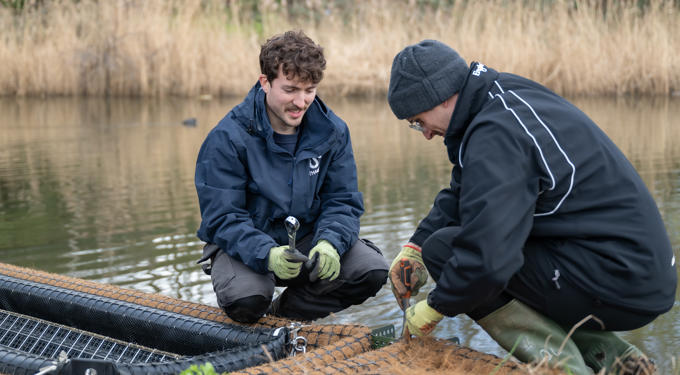
Improving blue spaces
We’re committed to bringing everyone along on our journey to become a net zero organisation and that includes residents, partners and colleagues.
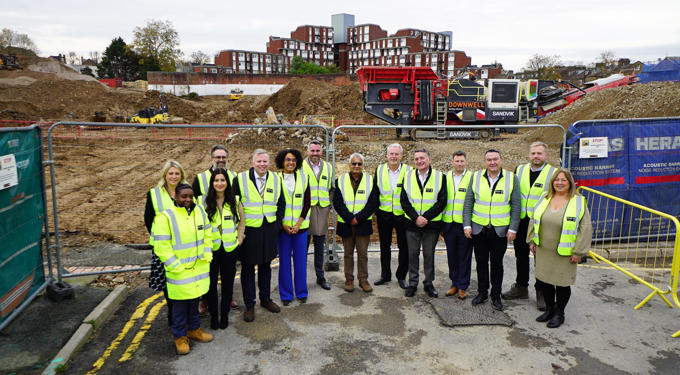
Holloway Park regeneration
Our approach to development isn't just about the homes we’re building. We also look at how we can add value to the surrounding area and local communities.
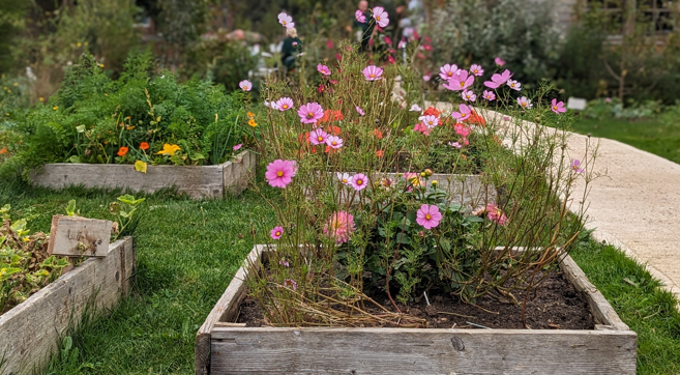
The Gateway Garden initiative
Town and Country Housing is working in partnership with other organisations to support an initiative billed as ‘a place where people and plants can grow’.
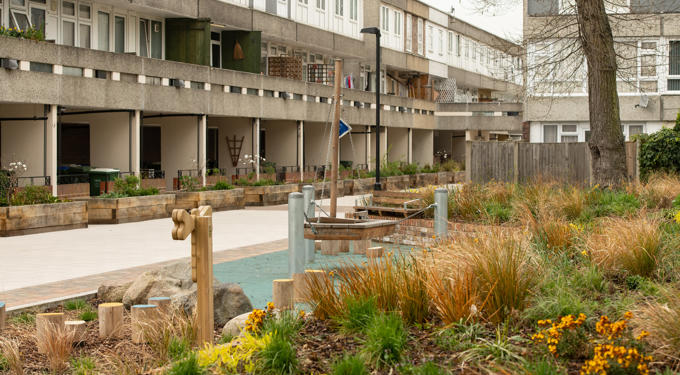
Greening grey areas brings benefits to people and nature
Two previously grey 1960s housing estates, home to 1,700 people in South Thamesmead, are now bright, beautiful, biodiverse spaces thanks to an award-winning first stage of a £10m transformation of public space.
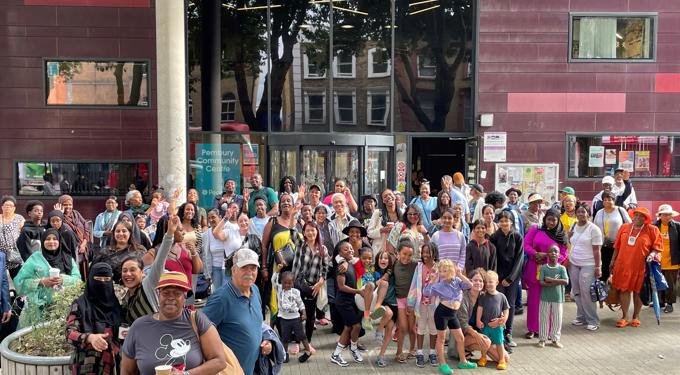
Community support comes in many shapes and sizes
There’s much more to the Pembury Community Centre than meets the eye. For some people it’s a base to meet up and chat. For others it’s a place where they can find activities to keep their children entertained.
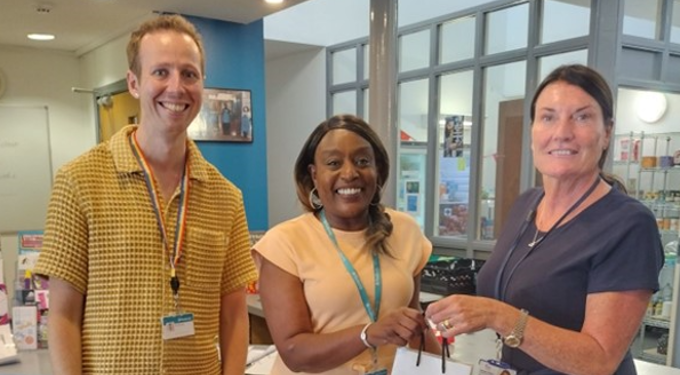
Working with like-minded organisations to create value
We want to create value for our residents. Whether it’s providing homes that people want to live in, or the support that can help them thrive. So it makes sense that we want to do business with like-minded organisations.
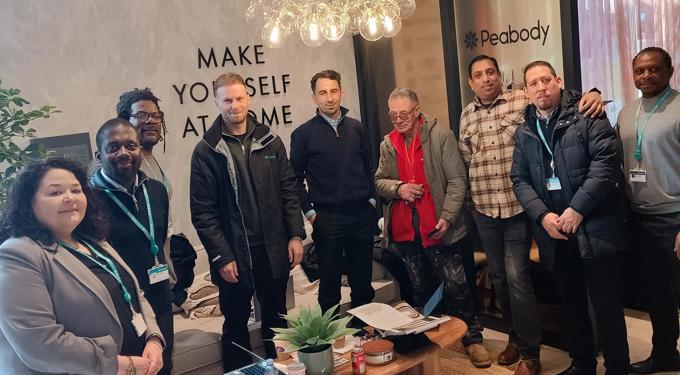
All hands on deck for repairs day
No one likes waiting for things to be fixed. So we’re working hard to improve how we handle repairs.

New home feels like happiness
Happy, more confident, and free of stress is how a domestic abuse survivor describes herself after moving into her new home.

Tackling food poverty
Thirty-five tonnes of food, enough for 80,000 meals, was saved from waste and given to Londoners in need over the Christmas period thanks to the London Food Insecurity Network (LFIN).
The LFIN gives struggling social housing residents in London access to more and better food, so no one goes to bed hungry. This is particularly important in the current environment where our latest Peabody Index showed that almost a third of those surveyed have a household income of less than £20,000.
We worked with The Felix Project, HACT and other housing associations to hold 76 winter food market events across the capital. Local people could stock up on fresh food and store cupboard ingredients and socialise in a warm and welcoming environment.
The winter markets were welcomed by residents, with one saying it hadn’t only helped them “massively financially”, but also mentally, as “chatting to people in the queue really cheered me up too”.
Listening to residents
Residents at Mural House in Southwark were concerned about the lack of communication and response to complaints.
So we worked with them to address their concerns and make a plan to deal with them.
Residents now have direct access to key staff and can arrange meetings themselves. We also gave them money to set up an independent residents group and supported them to start community initiatives such as an allotment.
“Forming a Resident’s Association has brought everyone in our block together in a really positive way. We’ve been able to get to know one another better through the RA meetings and socials, and it’s enabled us to work collaboratively to tackle problems.
“We’ve used the start-up grant to begin work on a communal vegetable patch, and we have a louder and stronger voice to address concerns and issues we have with Peabody.”
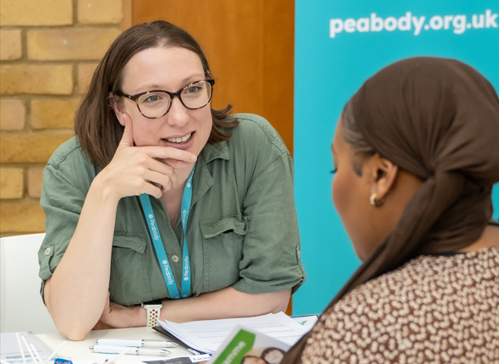

Apprenticeships benefit more than just the apprentice
For Dave Prouten, head of Connect Property Services, part of Peabody’s property maintenance division, apprenticeships are important for more than one reason.
The first is because he probably wouldn’t be where he is today without his own apprenticeship. And the second, is because they’re positive not only for the individual apprentices themselves, but also the organisations that take them on, and the wider economy.
For apprentices, it’s the chance to study for a career without going to university and getting deep into debt. And for those who are more practical and prefer to work with their hands, it’s a great route to gain on-the-job experience.
For social housing providers like Peabody and others in the wider construction sector, apprenticeships can help fill the gaps in the dire skills shortage that we’re currently facing. As Dave says, by teaching people how to do the job, we avoid losing essential trades skills and help advance our workforce.
“Apprentices get real life experience while being paid,” he says. “They provide an opportunity for people of all ages and abilities to learn new skills or improve their skills. It could be younger people trying to get into an industry, or someone returning to work after a long period off. Apprenticeships give people a good grounding in whatever industry they work in.”
He also believes apprentices bring enthusiasm and fresh perspectives. And in most cases, they are a great asset to the organisation they’re working with. There are also financial benefits for the organisation as they get to train people to do the jobs they need and create clear pathways for progression.
Connect Property Services currently has six apprentices based at Houghton Hall in Bedfordshire, in Peabody’s North Counties region. They’re learning skills in plumbing, electrical work and carpentry either at the training centre or by shadowing a colleague visiting residents’ homes to make repairs.
Peabody has a total of 40 apprentices enrolled in a variety of different roles across the organisation.
Valuable support
A resident in Wandsworth was struggling to pay her gas bill.
Our Financial Inclusion team helped her apply for a grant, only to find that she’d been missing out on £66 a week in pension credit since her partner died of Covid.
When she received the £10,296 owed to her, she was very happy and said: “I could probably have the heating on every year for life now!”
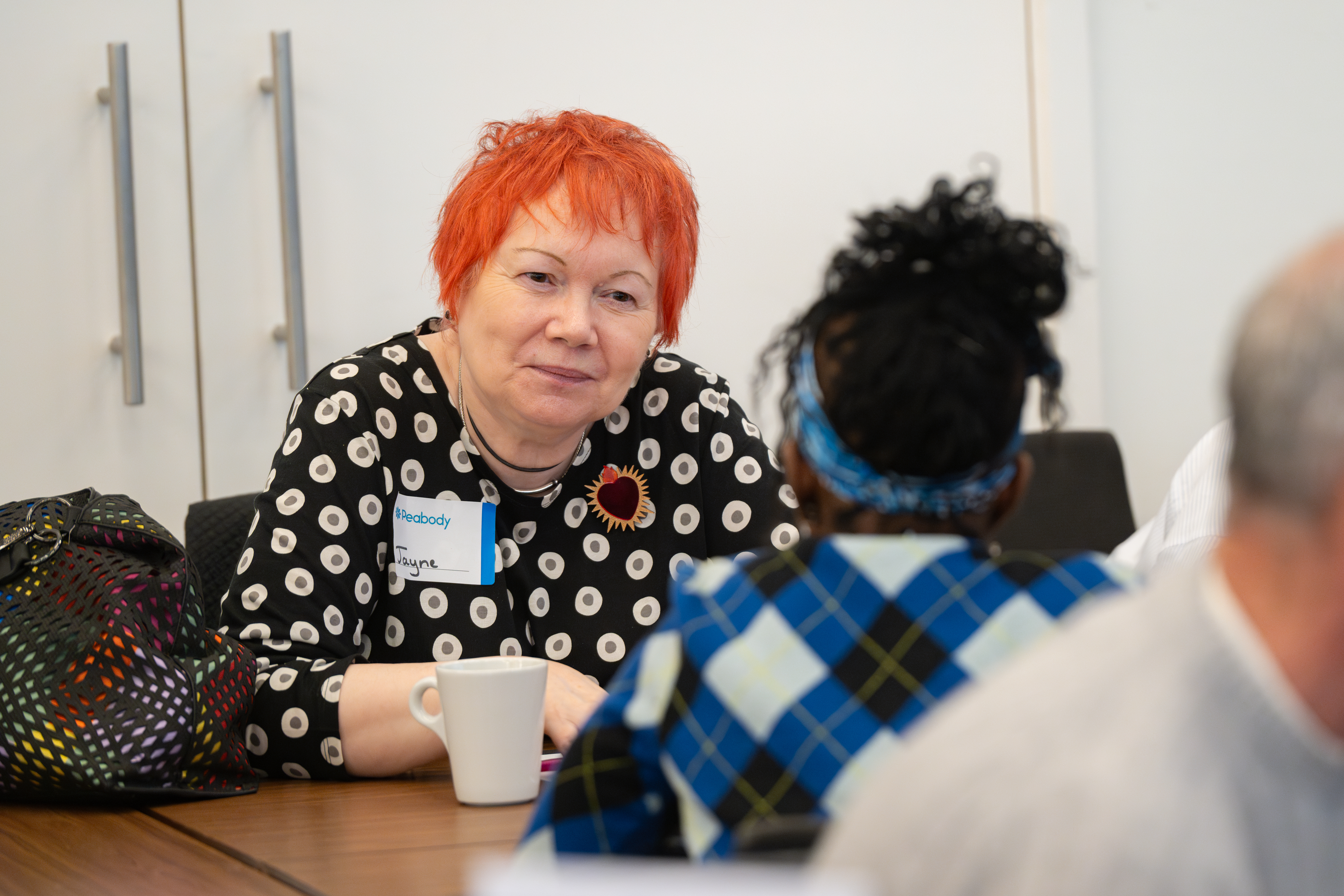
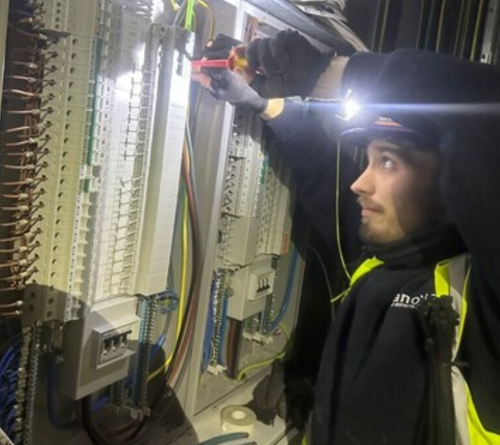
It’s never too late to learn
Billy Bennett isn’t shy to admit he should have worked harder at school. At 23 years old, he’s just passed his maths GCSE and says it was much harder to do now while working. But thanks to one of our partners, YouthBuild Ventures UK, Billy has had the chance to prove it’s never too late to learn.
Billy, who grew up in Abbey Wood in Thamesmead, works four days a week as an apprentice electrician on a construction site for homebuilder Durkan. He spends one day a week at college working towards a functional skills qualification – designed to help people develop their essential maths, English and ICT skills.
Billy is now on track to become a qualified electrician. And while he’s not in any hurry to leave the security and support of his trainee role, he’s excited by the potential his apprenticeship has given him.
“By the time I’m 40 I want to be higher up the ladder,” he says when asked about the future. “I now know that things don’t just get given to you. You have to show that you’re willing to work hard for what you want.” Asked if he’d recommend doing an apprenticeship: “Definitely,” he says. “It’s so worthwhile.”
Darwin Court food bank provides much needed support
The Darwin Court food bank in Southwark provides an essential service for about 90 residents each week, with the ages ranging from 16 to 94.
Thanks to partnerships with Purdy, one of our maintenance contractors who’s helping fund the project, and charities, The Felix Project and City Harvest who provide food donations, residents are able to pick up cupboard staples such as eggs, milk and bread.
For many (160 families are registered) it’s also a chance to get out of their homes, meet their neighbours and have a chat. With living costs continuing to rise and a reported 385,000 people using food banks last year, services like this are an important part of our commitment to providing help and support so residents can flourish.
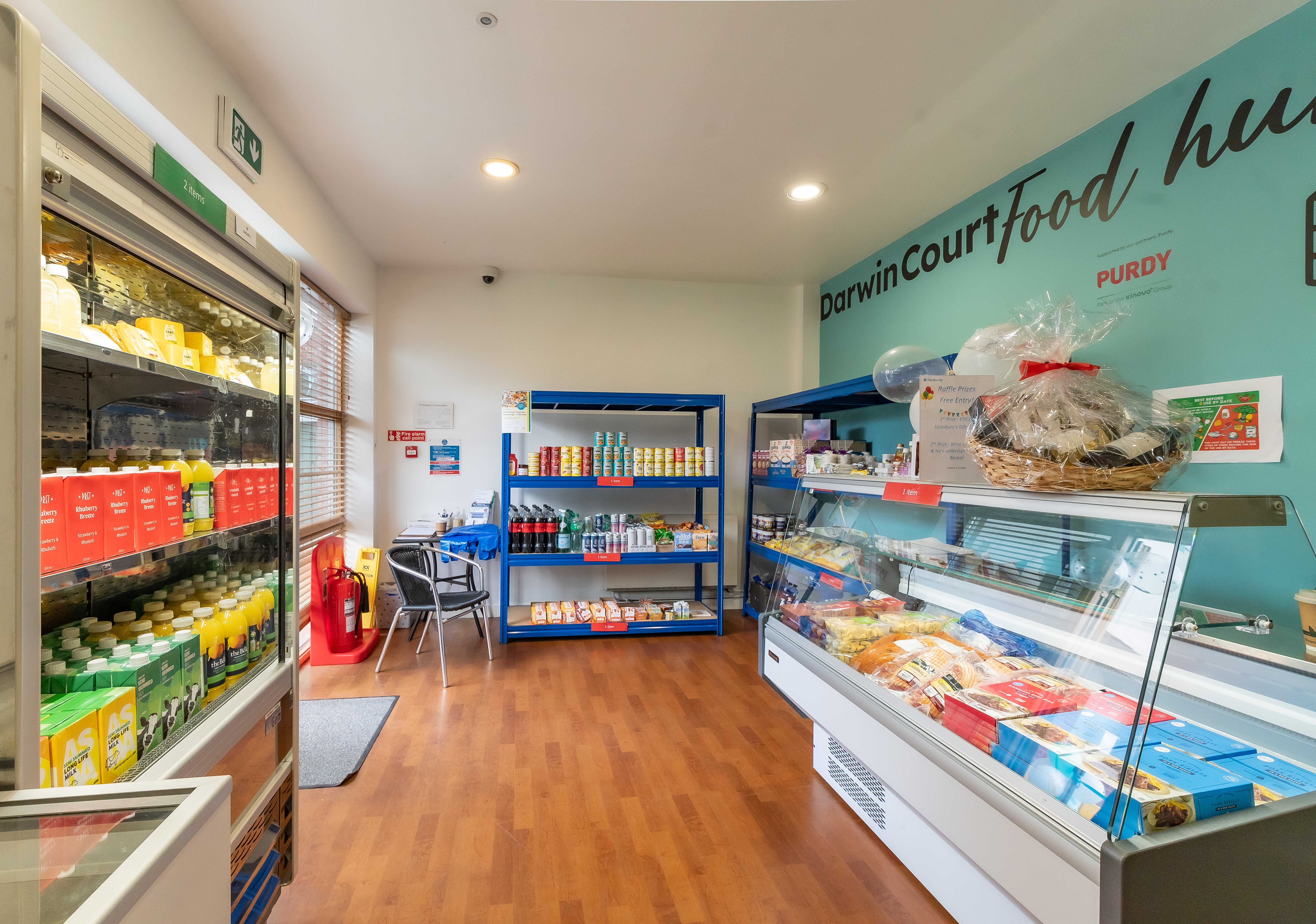
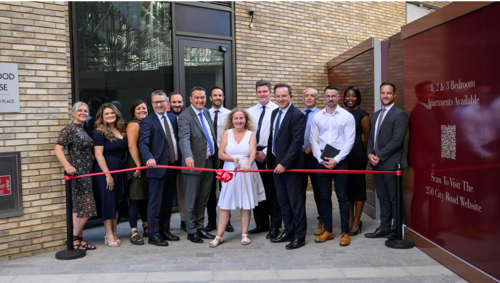
Fostering a culture of lifelong learning, curiosity and progress
After studying for an apprenticeship in Business Admin Level 3, Rosalie Pring is now working as a permanent Customer Care Coordinator and really enjoying what she’s doing.
Studying alongside work isn’t always easy, but Rosalie’s in no doubt that an apprenticeship is a great way to kick-start your career, or even change your existing one. “I’ve picked up so many transferable skills,” she says, adding that while she’d never imagined herself donning a hard hat and steel toecap boots to visit a building site, she learnt a lot from shadowing a range of different teams.
“If you’re starting out or thinking of changing jobs, do it as soon as possible. Experience matters, so working while you get a qualification – and no student debt! – is a good place to start.”
Hospital Discharge Service
NHS Trusts can refer any resident to our Hospital Discharge Service if they need help preparing their home for their return following a hospital stay. Our support can be minor or more involved.
While in this case, the initial referral was for a deep clean, it soon became clear that more support was needed. The resident’s home had no heating and a family of 15 cats had caused extensive damage throughout. Once our team had built up trust with the resident, we were able to work with partner agencies to secure funding and make the home safe for her return.
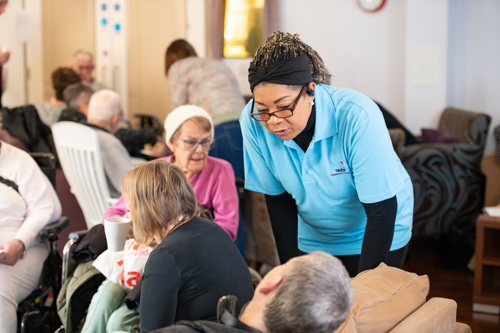
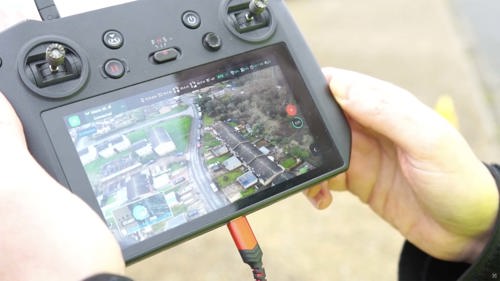
Using drones to help our greener homes programme
With financial pressures coming from all angles, it’s essential that energy efficiency improvements are made to the homes that will benefit most. So we’ve partnered with Innovate UK and start-up Kestrix to pilot cutting-edge thermal imaging technology to help us identify the homes in Potters Bar, Hertfordshire, that need upgrading.
State-of-the-art cameras fitted to aerial drones take pictures that show the surface temperature of the building. Then, with the help of artificial intelligence (AI) software, we’re able to determine the existing levels of heat loss and what improvements need to be made.
This not only saves time and helps us prioritise our retrofit activities, but ultimately helps us achieve our goals of lowering residents’ energy bills (by as much as £400 a year) and reducing our carbon footprint.
Everyone’s involved in improving blue spaces in Thamesmead
In February, local residents and school children helped plant more than 400 plants in and around Gallions Lake in West Thamesmead to help increase the biodiversity of the local landscape. They helped choose the plants – all of which are native to Thamesmead – and used them to create a new wetland system.
Together the chosen species, which include Forget-Me-Not and Yellow Iris, will provide food, cover and habitat for a range of wildlife, as well as help attract pollinators like bees, birds, and moths. Thamesmead is home to 7km of canals and five lakes.
The recent £170,000 improvements at Gallions Lake add to the 1,100sqm of floating reedbeds that Peabody has created in many of these areas.
“This type of co-creation and collaboration with the community is an extension of the wider work we’ve been doing in Thamesmead over the past few years,” said Jack Gower, Peabody’s Landscape Activation Manager for Thamesmead. “Residents have been involved in a range of exciting activities like tree planting, landscape design and stewardship of community gardens.”
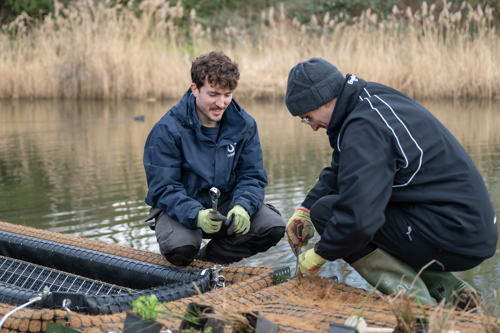
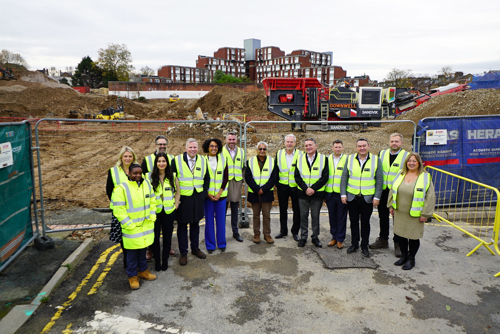
RITTERWALD commends the wide reach of Holloway Park regeneration
Holloway Park is more than a regeneration project on the site of a former women’s prison. It’s a carefully thought-out development that’s designed to acknowledge the important role the prison played in the lives of so many, while also making a positive difference to the future of the local area.
It will have 985 new homes – 60 percent of which will be affordable, and many will be suitable for families. During the construction phase, there will be apprenticeships for local people, with the goal of filling at least 30 percent of the roles with women. And there’ll be an on-site ‘green skills’ hub offering construction training programmes.
It will also have a special women’s building with dedicated services tailored to the needs of local women and 60 extra-care one-bedroom homes. There’ll be a 1.4-acre park, as well as a sensory garden and specially commissioned art using things reclaimed from the prison, to honour the heritage of the site. The site will also be home to commercial spaces, including cafes, restaurants and shops. On the environmental sustainability side, the homes will get their heating and electricity from air source heat pumps, while power to communal areas will be provided by solar panels.
The project is a partnership between several groups, including Peabody, the Greater London Authority (GLA), the London Borough of Islington and London Square.
Gateway Garden
This Dover-based initiative is billed as ‘a place where people and plants can grow’. It aims to support wellbeing and learning in a calm environment and is a joint project between Dover Counselling Centre, Town & Country Housing (TCH), Dover District Council and Future Skills.
TCH has helped to fund and support the initiative in various ways, including colleagues using Peabody Promise Days to volunteer at the site.
The project has also been supported by TCH Repairs who donated scaffold boards that have been turned into planters, a skip, gardening tools and other useful equipment. Swale provided plumbing expertise and George Jones provided £15,000 of electrical works as part of their social value contribution.
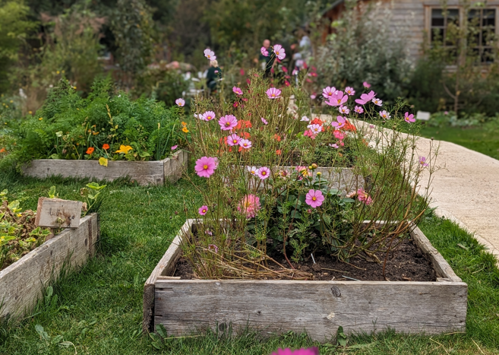

All hands on deck for repairs day
Fixing repairs takes time and energy. So rather than send individual contractors out to fix single issues in a community where many residents have reported issues, why not fix everything at once?
On one day in February in New Mansion Square, Battersea, a group of plumbers, electricians and other handypeople from a range of Peabody contractors, including Milverdene, Gilmartins, PBSL and Purdys came together to visit 32 residents who had reported issues. All of them either had their issue fixed on the day or received an appointment for a return visit to sort the problem.
The day brought together experts from a range of Peabody teams, including the local Neighbourhood team, New Homes, Property Services and Property Maintenance, as well as Sales and Marketing, Peabody Group Maintenance and Communications. Residents welcomed the event, which provided a safe local space for them to report issues face-to-face and, in most cases, see immediate progress.
In a survey sent out prior to the event, residents reported 79 issues and seven residents came along on the day to report a problem. A further 28 repairs were raised with Gilmartins and 67 appointments were made with other contractors to fix things.
Between April 2023 and March 2024, the Repairs team completed 232,447 repairs, with the majority relating to leaks, damp and mould.
Greening grey areas brings benefits to people and nature
Two previously grey 1960s housing estates, home to 1,700 people in South Thamesmead, are now bright, beautiful, biodiverse spaces thanks to the award-winning first stage of a £10m transformation of public space.
The work is part of our long-term regeneration of Thamesmead, where improving open spaces for both people and nature is a key priority. Better access to open space can help address major health issues such as obesity, diabetes and heart disease, as well as supporting mental wellbeing and relieving stress. And by improving biodiversity by 20 percent, we’ve made the area more welcoming to new species of plants and animals.
Prior to the transformation, both neighbourhoods had a limited range of trees, many of which were too big for their surroundings. They were blocking natural light from homes and causing damage with their roots. There were large areas of concrete and very few plants, meaning the area looked bland and unwelcoming. Though maintained, the green spaces hadn’t been improved or significantly invested in since the estates were built over 60 years ago.
With a view to improving the day-to-day experience of people living on the estates and creating new habitats for nature, we set about ‘greening up’ the grey areas. The project was guided by our Green Infrastructure Strategy and Biodiversity Action Plan. Both aim to enhance and connect natural spaces, and create healthier and more social places, climate resilient places.
What did we do?
- Planted a mix of trees better suited to the space, replacing those that weren’t thriving or were too intrusive
- Planted long-living plants offering rich texture and a long season of flowering colour
- Used a mix of native and semi-native plants of varying heights and fullness to attract pollinating insects and extend the flowering season
- Added nesting boxes and fruit trees to promote biodiversity
- Created rain gardens to improve drainage and help prevent flooding
- Introduced new lighting, play and seating areas.
As part of the project, we also trained our Environmental Services team in horticulture so they could help make sure the area flourished.
We involved members of the local community throughout the design and construction process through surveys, drop-in sessions and other activities, such as planting days and birdbox making sessions. Feedback has been positive, with many local residents saying how much better the areas looks and feels.
We’ve learned a lot from the first stage, including the importance of involving the local community in what we’re doing, monitoring progress, and having a plan for how to maintain the space.
We’re now working on finalising the second stage of improvements nearby. This includes landscaping more than three hectares of shared space, including an underused green chain walk. These changes are being made in close collaboration with a diverse community group, trained and paid the London Living Wage for their involvement.
Project partners: Designers LUC and Levitt Bernstein Associates, and contractors idverde.
Community support comes in many shapes and sizes
There’s much more to a local community centre than meets the eye. For some people it’s a base to meet up and chat, attend a fitness class or pick up information.
For others it’s a place where they can find activities to keep their children entertained or meet like-minded parents. But for one young person, their local centre is like a second home – a place of solace where they feel they can be their true self.
“I come here (to the youth club at Pembury Community Centre in Hackney) basically every day. It’s like my second home... it’s been part of my daily routine for years. I come home from school and then straight to youth club. I feel like I can be my true self.
“I hate school - coming here helps. I can actually have fun and enjoy myself. It takes a lot of things off my mind.”
Supported by the Peabody Community Foundation (PCF), the youth programme at Pembury helps young people as they move into adulthood. It provides after-school and holiday youth clubs, as well as football coaching, performing arts groups and a fashion and textiles programme. It also runs a range of other specialised activities and trips all aimed at building young people’s confidence, providing them with safe spaces to explore their creativity, and promoting physical and mental health.
Helping boost people’s confidence
But the centre’s not just for teenagers. The Communities team in Pembury also works with a range of local partners to help provide support for all ages. It offers free baby groups, workshops, and a range of social clubs and activities aimed at reducing isolation and promoting health and wellbeing. It also encourages residents to build their own networks.
One mum who brings her daughter with autism and selective mutism to art sessions at the centre really appreciates the way it’s helping boost her daughter’s confidence. “Having these sessions locally has really benefited my daughter as she can’t use any form of public transport. This has been a great opportunity for her to be creative in a fun, safe place.”
Each year, the PCF empowers residents to bring their own ideas to life through its microgrant programme. Residents can apply for £500 to run their own community events, workshops or activities that benefit their local community. During the year, local residents received £2,500 to help run a range of activities, including a community Windrush event, yoga and wellbeing classes, a bingo club for older members of the community, and a children’s and family community day.
Working together to help families out of poverty
Another example of helping to empower residents is the Make and Mend Course at Pembury. A partnership between Peabody and Kundakala, the course helps teach women basic tailoring, alterations and sewing skills. Participants are able to sell the things they make through the Kundakala Collective’s website and at markets.
For some residents, like Nadine, the course has helped her believe in herself. “It’s built my confidence and self-esteem because I’m engaging with new faces. I’ve learnt that whatever you set your mind to do you can achieve.”
As well as learning how to use and look after a sewing machine and work with different materials, Nadine has been shown how to plan and organise her work. She’s now selling her own purses, tote bags and laptop cases. “I was taken aback by this,” she says. “I’ve never done anything like this before.”
Working with like-minded organisations to create value to residents
Everything we do as an organisation aims to benefit residents. Whether it’s providing affordable, safe and secure homes that people want to live in, or the support and advice that can help them thrive. So it makes sense that we want to do business with like-minded organisations.
Over the past year, our suppliers, contractors and partners generated more than £12m in social value – that’s money that benefits residents and the those living in the communities in which we operate.
Helping with the high cost of living
One of those is TCL Group, a construction services company that specialises in property maintenance and refurbishment. For us, they look after any faults or defects that occur in the early stages after a new housing scheme has been delivered. For the communities in which we both operate, they provide vouchers and supplies to help people struggling with the high cost of living.
During the past year, TCL has delivered almost £600,000 worth of social value in the form of shopping vouchers for major food and household retailers or packs of key household supplies for cleaning and maintenance. They are distributed to areas that our Communities team identifies as being in need and have so far supported estates in Westminster and Waltham Forest.1
Helping create future talent
Elsewhere, KBH Haus, a fire safety and repairs contractor, provided four construction services apprenticeships and support and advice to 24 students at Barking Abbey School in Essex during the year.
KBH colleagues also regularly roll up their sleeves and provide voluntary support for building and decorating projects on Peabody estates and elsewhere in the community.
During the year, they helped build and install new benches and planters at Richard Cloudesley School in Islington and provided level paving to ensure mobility access for all students. They also put in new flooring, heating and bathroom facilities at the community centre on the Cumberland Market Estate in Camden.
Across a broad range of outcomes, including supporting confidence and careers development for young people and adults, financial inclusion and improved greenspaces and community facilities, KBH produced nearly £6.2m of social value during the year.2
Championing and embedding social value
Partnerships such as those with TCL and KBH are examples of us working with like-minded organisations.
To ensure this happens, in 2023 we introduced a 20 percent social value weighting in all new contracts with significant suppliers. As well as delivering quality and value for money, anyone looking to work with us must demonstrate clear social and economic benefits to local residents and communities. This followed a two-year trial, which generated an estimated £20m worth of social, economic and environmental benefits for communities.
1 For this project, social value is measured in terms of the number of recipients who experience improved financial comfort and therefore less strain on their ability to meet the rising costs of day-to-day needs. The proxy value outcomes represent a complex consideration of wellbeing improvements (earnings potential and improved health), as well as savings to the state on social programmes. In the case of TCL’s support, this has been monitored and valued using the HACT Social Value Insight tool.
2 The total social value figure for KBH Haus comes from a combination of reports received on the Social Value Portal (previously utilised by Peabody) and the HACT Social Value Insight Tool (which was implemented within the 2024 financial year).
New home feels like happiness, domestic abuse survivors says
Happy, more confident, and free of stress is how Susie* describes herself after moving into her new home with her three children in Waltham Forest. Her son loves being able to play football in the garden, her daughters are happy to have a nice room where they can chat and do their homework together, and Susie is particularly enjoying being able to cook and bake in the new kitchen.
This is all possible thanks to our partnership with charity Furnishing Futures and the London Borough of Waltham Forest. Together, we’re running a pilot scheme to provide fully furnished, affordable homes to three households who have fled domestic abuse and applied for social housing after living in refuge accommodation. Susie and her children are the first family to get a new home as part of the project and she’s in no doubt that it’s improved things for her and her children.
“When I wake up, I know it’s my house,” says Susie. “I feel happy. I am looking forward to every day.” She’s even stopped her anxiety medication.
Before they moved, Susie’s three children were sharing one room, which caused lots of arguments. Now, she says, they don’t argue at all. “My son has his room, he’s happy. My two daughters, their mental behaviour and attitude has really changed. They’re now more calm and balanced, and more friendly with each other. It has impacted their relationship with each other.”
Often when families need to escape abusive situations, they’re forced to move into temporary accommodation or refuges a long way from the areas they know and their friends. While refuges are furnished and have communal kitchens and living spaces, temporary accommodation is often unfurnished and in need of repair.
By contrast, Susie’s new home is just a five-minute walk from the children’s school, meaning they’re still close to their friends and other members of their family. And, thanks to the funding from Peabody and Furnishing Futures’ expertise and donations, their home has been kitted out to a standard that would have taken Susie years to achieve on her own.
“I’m only the one person and I have to save the money. It’s hard,” she says, adding that she may even had to take out a loan. It’s been so nicely done. Thank you so much. I really appreciate it.”


